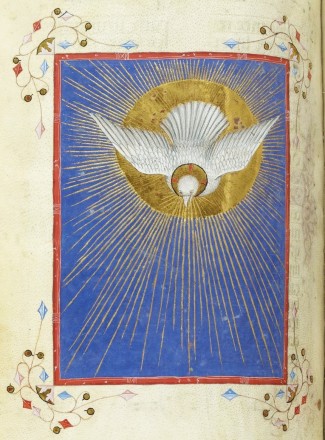What is man, O LORD?
Since man has Him, the Spirit is certainly in man—in his soul and through his soul in his body too. It is the nearest, most intimate and most indispensable factor for an understanding of his being and existence. But while He is in man, He is not identical with him. We have seen already that this would imply a transformation of man into God, which is excluded by the fact that Spirit is a conception of activity. The Spirit is not transformed into the soul of man, although He first and supremely creates the soul of man and make is His own dwelling. Nor does he become corporeal, although as the Spirit of the soul He immediately becomes the Spirit of the body and man is ordained to be not only spiritual soul and besouled body, but also spiritual body. He does not merely become the human subject. The human subject is man as soul, and it is this which is created and maintained by the Spirit. Bur for this very reason the Spirit lives His own superior and alien life over against the soul and the human subject. He is not bound to the life of the human subject. He cannot, therefore, be reached by its death. When the subject dies, He returns to God who gave Him. In distinction from the human subject, He is immortal. Whether or not death is the last word concerning man depends upon whether He is given again and that “may” is renewed.[1]
And the very God of peace sanctify you wholly; and I pray God your whole spirit and soul and body be preserved blameless unto the coming of our Lord Jesus Christ. –I Thessalonians 5:23
But ye are not in the flesh, but in the Spirit, if so be that the Spirit of God dwell in you. Now if any man have not the Spirit of Christ, he is none of his. 10 And if Christ be in you, the body is dead because of sin; but the Spirit is life because of righteousness. 11 But if the Spirit of him that raised up Jesus from the dead dwell in you, he that raised up Christ from the dead shall also quicken your mortal bodies by his Spirit that dwelleth in you. –Romans 8:9-11
Barth is primarily engaging with the so-called trichotomous versus the dichotomous view when it comes to a human faculty psychology as found in I Thessalonians 5:23. In the prior context (in the CD) he has argued against the trichotomous position in favor of the dichotomous locus, in regard to human being being soul and body versus body, soul, and spirit. He argues, as the passage above illustrates and develops, that the Holy Spirit, particularly as He is referred to in the Pauline corpus, is the animating, the activating, the dynamic and grounding aspect of what it in fact means to be genuinely human as that is guaranteed in and from the plenitude of God’s triune life, mediated to humanity through the humanity of Jesus Christ, and given lively valence in and through the dynamism of the Holy Spirit. I agree with Barth here.
While a person still has life on this earth they are constantly being activated by the Holy Spirit. That is to say, even if a person is in the pagan status, the Holy Spirit, nevertheless is engaging them, wooing them with the breath of Christ, in regard to sin, righteousness, and the coming judgment. We have not been left as orphans. And even though we indwell these fallen bodies of death, by God’s grace, through the grace of God’s humanity, we remain related to Him in and through the hovering and activating work of the person of the Holy Spirit. But if, as Paul teaches, a person does not have the Holy Spirit, that is in a saving realization, in union with Jesus Christ’s humanity, then that person, ultimately will fall into dissolution and reap the wind and whirlwind of their self-possessed non-being; this is known as hell.
[1] Karl Barth, Church Dogmatics. The Doctrine of God III/2 §46 (London/New York: T&T Clark, 2010), 157.

